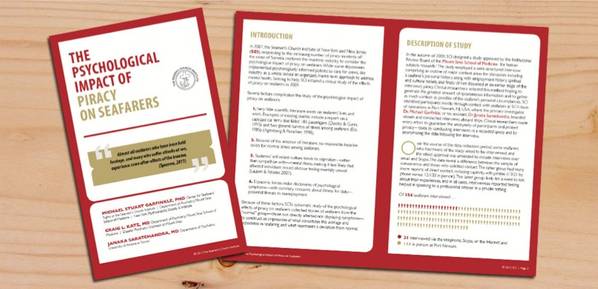
The Seamen’s Church Institute (SCI), with New York’s Mount Sinai School of Medicine, report on the effects of piracy on seafarers.
While incidents of piracy decline off the Horn of Africa, an inestimable number of seafarers continue to bear the psychological impact of captivity by pirates. To describe their condition and to advise the maritime industry on how to care for affected individuals, the Seamen’s Church Institute (SCI), in collaboration with New York’s Mount Sinai School of Medicine , releases a report from its clinical study of the effects of piracy on seafarers. The first of two reports introduced in London recently describes the study and major findings from 154 seafarer interviews.
Some of the highlights of the study’s findings include:
• Most seafarers interviewed did not think that their job is unduly stressful under normal conditions.
• From 2009 to 2011, overt concern about piracy increased along with anticipatory stress about transiting piracy zones.
• The frequency with which seafarers expressed appeal for armed guards on board ships for protection increased during the study.
• Of those seafarers held captive or attacked by pirates, most experienced clinically significant symptoms afterwards.
• Less than ⅓ of these seafarers felt that they had received adequate follow-up care.
• Seafarers cited concerns about disclosing private medical records and being blacklisted as barriers to receiving medical care.
The final section of the report addresses some of the topics introduced into SCI’s study from seafarer responses. Issues such as assessment, confidentiality agreements that protect doctor-patient relationships and stigmas associated with mental health treatment remain major concerns. To respond to these, the authors of the report stipulate the necessity for a worldwide collaboration between the industry, seafarer welfare organizations, including those such as the Maritime Piracy Humanitarian Response Program and Oceans Beyond Piracy , and the international mental health community.
“During encounters with pirates, seafarers experience traumatic events that may lead to clinically significant emotional consequences,” SCI’s Clinical Researcher Dr. Michael S. Garfinkle states, “however no attempts to describe the emotional circumstances of seafarers currently exist to help in assessing and treating them.” SCI aimed this first report, entitled “The Psychological Impact of Piracy on Seafarers,” at giving persons in the maritime industry a direct look at the data from SCI’s clinical study and some of its implications. In discussions with shipowners, SCI hopes to stimulate Human Resources protocols for treatment. The second report, a scientific peer-reviewed paper, follows, with planned publication in early 2013.


